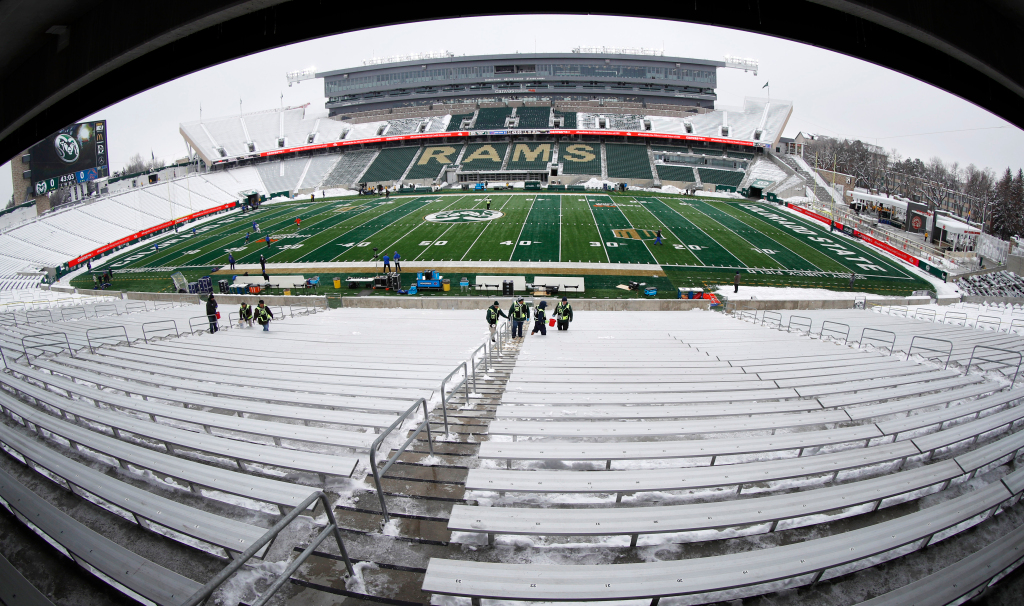Paul Finebaum knows the analogy shows his age. But it fits. In fact, when it comes to college football in the age of COVID, the comparison’s probably never been more on the nose.
“Maybe because I grew up watching the ‘Godfather’ movies, but I see the commissioners of the Power 5 conferences as the five crime families,” the longtime ESPN/SEC Network host told The Denver Post. “And they all go to the back room of a little Italian restaurant and they’re trying to decide, ‘Which one of us is in charge?’ None of the five want to cede power to the next one.
“You have some relationships that have developed — the Pac-12 is going to join up with the Big Ten, for example. The Pac-12 is just lucky that it still has a seat at the table. And then you have the other three. They all have relationships, but in this case, there isn’t a lot of evidence of it.”
To wit: The ACC goes with a 10-league-games-plus-one model for 2020, ostensibly to help protect historic rivalry games such as Clemson-South Carolina, Florida State-Florida, Georgia Tech-Georgia and Louisville-Kentucky, an offer the SEC can’t refuse. Only the SEC responds, in kind, by announcing a 10-game, conference-only slate, kissing those rivalry games goodbye. As scheduling alternates between a game of chicken and one of musical chairs, the Big 12 continues to wait out the storm.
Meanwhile, the CSU Rams’ football activities are on hold after as many as 17 people within the athletic department hit the state’s Department of Public Health and Environment outbreak database as potential COVID-19 positives. And Major League Baseball’s launch without a bubble, the pilot for where the NFL and the NCAA want to go, can’t stop hitting icebergs. A week into its season, no fewer than eight of MLB’s 30 franchises have been affected.
In April, it was about saving August. Now that August is here, and the virus is, too, are colleges — the Rams, the CU Buffs, UNC, Mines — still doing the right thing by pushing the boat out on the 2020 football season? If the Pac-12 didn’t have a television network to feed, are the Buffs even entertaining this conversation?
“I doubt it,” Chuck Neinas said.
Neinas is the president of Neinas Sports Services in Boulder, a consulting guru, the former executive director of the College Football Association (1980-97), ex-commissioner of the Big Eight (1971-80) and interim commissioner of the Big 12 (2011-12), helping to keep the latter from imploding a decade ago after the defections of CU, Nebraska, Missouri and Texas A&M. He remains one of the closest things big-time college football has to a sage figure, a Gandalf of the game.
“I’m not sure they’re going to play,” Neinas said. “They’re making all the plans, but you know, you take a look at the Pac-12. California and Arizona are rampant with the virus. Look at Los Angeles alone. How are UCLA and USC going to play? And the students coming back to campus, if they’re (spreading it)?
“You take a look at the paper and you see half of these new cases are people in their 20s. You add all that together and … you know damn well you can have the best game plans in the world but when the ball is kicked off, the game plan goes out the window. And that might be what happens here. They’ve got a lot of game plans. But when they get ready to kick off, the virus may throw that out the window.”
“Glory days may be over”
College presidents fear the inherent risk of that virus — to students, to staff, to communities as a whole. Unlike the NHL and NBA bubbles and even NFL teams’ headquarters, campuses are giant petri dishes, and further sequestering 18-to-22-year-olds from their student peers expressly for football raises legal questions that neither the NCAA nor its attorneys want to tackle right now.
“Obviously, the most important thing is health and safety,” senior CSU wideout Warren Jackson said earlier this summer. “So I would feel concerned about that. I want to be safe more than anything. And nothing’s more important than my life.”
But the gang in the ivory tower have also seen the books. And Finebaum’s crime families have bills to pay.
“They need to, let’s face it, at least try to get some money,” Neinas noted. “And young people want to play. That’s the sad part.
“I’ve tried to ask some of my friends about the reality of a spring football schedule. I don’t know if there’s any reality to it at all. I just heard the news (this week) that Florida had a record number of deaths. It’s really difficult to see. And, of course, you’re going to play without people in the stands, and how much (financial) freight is TV going to carry? And there’s a lot of unanswered questions.”
Including this one: Is the college sports bubble, the multi-million throne upon which NCAA president Mark Emmert rests his backside every day, about to burst?
A pause.
“Let me just say this: I don’t think we need to have 40-inch television sets in every player’s locker,” Neinas said. “There’s another thing you have to think about: How many major football-playing institutions today are debt-free, in terms of facility construction. Those (bills) come due.”
In its financials reported to the NCAA for the 2018-19 fiscal year, CSU’s departmental expenses included $8.46 million in debt service. Payments on the bonds used to build Canvas Stadium, which opened in 2017, had been scheduled to increase to $12.2 million per year starting in 2021.
“They’ve got a big bond obligation and they get those bond obligations on top of the coronavirus,” Neinas said. “The glory days of college athletics may be over.”
“Not optimistic it will end well”
Iowa State athletic director Jamie Pollard laid bare his dilemma earlier this summer, fearing a shortfall of roughly $41 million if football is canceled this fall. CU athletic director Rick George has said the financial impact would be roughly the same in Boulder.
“We understand there are serious health considerations that are implicated by moving forward with sports,” Pollard wrote in a July missive to fans. “However, we are confident that our department can provide a safer environment for the athletes in Ames, where they are motivated by their teammates and competition to modify their social behavior.”
Safer environment? Probably.
Motivated by peers not to party? Experts still aren’t convinced.
“And that’s the key to this,” said Dr. Michelle Barron, a professor of medicine in the division of infectious disease at CU’s Anschutz Medical Campus. “I think that’s important, if we can maximize all we can do (off the field), or we can’t do it.
“That means, if (players) don’t follow the rules, you’re off the team for the rest of the year. There has to be some level of consequence for people who don’t follow the rules.
“The difference between prep and college football teams and the professional level is (the players) have a lot of money riding on these things. And if I had that big contract and was told, ‘(No partying)’… I’d imagine these circles are fairly tight. People who are constantly breaking rules get reputations, for better or worse.”
Or, in the case of Los Angeles Clippers guard Lou Williams, they just want to get some wings. Even if those wings are served at a gentleman’s club in Atlanta.
“I had an epidemiologist on our show,” Finebaum laughed. “Listen, he was trying to be aspirational. He said, ‘If everyone on college campuses will wear a mask and follow all the usual protocol, we’ve got a chance.’ And I got a text from a friend whose son just happens to be a player at a major, big-time program. He was listening to it and he wrote, ‘Is this guy out of his mind? He said you have to wear masks and not go to parties. They’re not going to wear masks and they’re going to parties.’
“So I am not overly optimistic it will end well. But this is one of those situations where I think everyone’s rolling the dice, everybody’s hoping against hope that maybe we’ll get there, maybe we won’t. There’s not a good plan. Every plan is being put together with cheap duct tape from the dollar store and just hoping that it sticks.”
Maybe the appropriate question isn’t whether there will be college football this fall — but should there be?
“I’ve yet to hear anyone answer (that),” Finebaum replied. “And I’m going to keep pursuing it. The one thing I just lose my lunch over, every day, is when I hear them all collectively say that the most important thing is the health of the student-athletes. If that’s the case, we wouldn’t be having these conversations.”


















